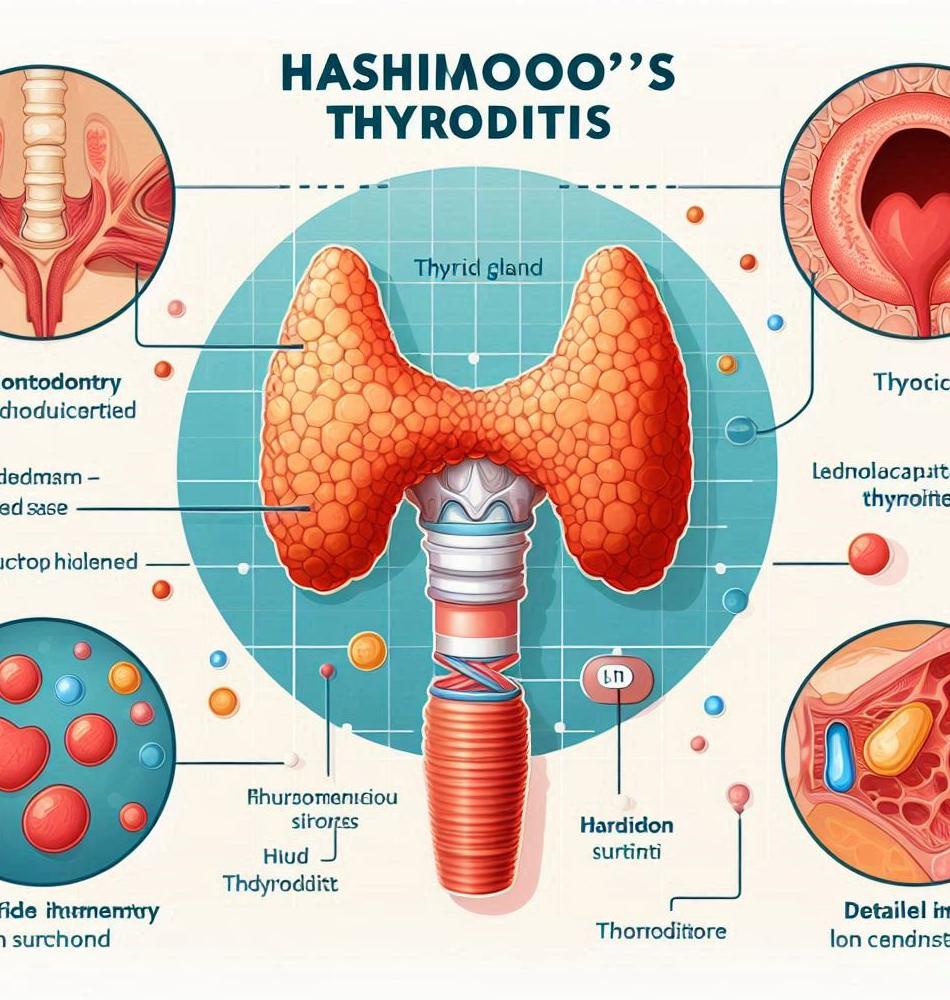Understanding the Differences: Hashimoto's Disease vs. Hypothyroidism ⚖️
When it comes to thyroid health, two terms often emerge in conversations: Hashimoto's disease and hypothyroidism. While they are connected, understanding their differences is crucial for anyone looking to comprehend thyroid function in the body better. This article aims to clarify these concepts, delve into their distinctive features, and make the complexities of thyroid health more relatable and engaging.
What is Hashimoto's Disease? 🩺
Hashimoto's disease, also known as Hashimoto's thyroiditis, is an autoimmune disorder. In this condition, the immune system mistakenly attacks the thyroid gland, leading to inflammation and, ultimately, an underactive thyroid – hypothyroidism. This condition primarily affects women, particularly those between the ages of 30 and 50. However, it can occur in men and at any age.
Symptoms of Hashimoto's Disease 🏥
Hashimoto's disease often unfolds gradually, and it may be easy to dismiss its beginnings as mere fatigue or slight weight gain. Common symptoms include:
- Fatigue
- Weight gain
- Cold intolerance
- Dry skin
- Hair loss
- Muscle weakness
- Depression
- Constipation
- Joint pain or stiffness
Understanding Hypothyroidism 🤔
Hypothyroidism, on the other hand, refers to the underproduction of thyroid hormones,whether due to Hashimoto's disease or other factors like iodine deficiency or thyroid surgery. It's a condition that affects individuals of all ages and genders, resulting in a wide array of symptoms associated with a slow metabolism.
Symptoms of Hypothyroidism 📋
The symptoms of hypothyroidism can be quite similar to those of Hashimoto's disease since Hashimoto's leads to hypothyroidism. Some of these symptoms include:
- Fatigue
- Weight gain
- Hair loss
- Cold intolerance
- Frequent muscle cramps
- Slowed heart rate
- Dry skin
- Depression
Causes and Risk Factors 🔍
Causes of Hashimoto's Disease 🌌
As mentioned earlier, Hashimoto's disease is an autoimmune disorder. While the exact cause remains unclear, several factors might play a role:
- Genetics - A family history of autoimmune diseases can increase risk.
- Environmental factors - Exposure to certain chemicals or radiation may trigger the disease.
- Hormonal changes - Fluctuations during pregnancy or menopause might activate Hashimoto's in predisposed individuals.
Causes of Hypothyroidism ⚡
Hypothyroidism can develop due to various factors, including:
- Chronic autoimmune disorders, like Hashimoto's disease
- Thyroid surgery or radiation treatment
- Iodine deficiency - Iodine is vital for hormone production.
- Medications - Certain drugs can impede hormone production.
- Pituitary gland disorders - Impaired functioning of the pituitary can affect the thyroid.
Diagnosing Hashimoto's vs. Hypothyroidism 🔬
Typically, a healthcare provider would diagnose these conditions through a combination of physical examinations and laboratory tests. Here’s how the process works:
Testing for Hashimoto's Disease 🧪
Diagnosis often involves:
- TSH (Thyroid Stimulating Hormone) test - Elevated TSH levels may indicate thyroid dysfunction.
- T3 and T4 hormone levels - Assessing these hormones helps understand thyroid health.
- Thyroid antibodies test - This test looks for antibodies indicating an autoimmune response.
Testing for Hypothyroidism ⚙️
For hypothyroidism, the process involves similar tests:
- TSH test - A significantly high result could indicate hypothyroidism.
- T3 and T4 hormone levels - Low levels confirm the diagnosis.
- Additional tests, if necessary, might include imaging studies or biopsy.
Treatment Approaches for Hashimoto's and Hypothyroidism 💊
While both conditions may require similar methods of management, the specific focuses may differ.
Treating Hashimoto's Disease 🏥
The primary goal in treating Hashimoto's is to relieve symptoms and manage the autoimmune response. Treatments can include:
- Thyroid hormone replacement therapy - Levothyroxine is commonly prescribed to normalize hormone levels.
- Regular monitoring of thyroid function - Essential to adjust medication dosages.
- Management of autoimmune components - This may involve dietary changes or supplementation.
Treating Hypothyroidism 💉
Hypothyroidism treatment also revolves around hormone replacement, mainly through:
- Levothyroxine - A synthetic hormone that helps restore hormone levels.
- Routine check-ups to monitor levels - These are crucial to managing the condition effectively.
- Lifestyle modifications might also be suggested to support overall health.
Frequently Asked Questions ❓
Here are common inquiries concerning Hashimoto's disease and hypothyroidism:
- Can you have Hashimoto's disease without having hypothyroidism? Yes, it's possible to have Hashimoto's with normal hormone levels initially.
- Is Hashimoto's disease permanent? Yes, it is typically a lifelong condition, but proper management can help individuals live full lives.
- Can hypothyroidism be cured? Hypothyroidism is usually a long-term condition, though manageable with treatment.
- Are the symptoms of Hashimoto's disease different from hypothyroidism? While they overlap, Hashimoto's often features inflammation and autoimmune markers.
The Connection Between Hashimoto's and Hypothyroidism 🔐
While Hashimoto's disease is a cause of hypothyroidism, not all hypothyroidism is due to Hashimoto's. Through understanding their relationship, you can gain a clearer picture of thyroid health.
Your healthcare provider can provide guidance in distinguishing between the two and ensuring effective management of either condition, if diagnosed. It’s essential to take symptoms seriously; if you suspect a thyroid issue, consulting with a healthcare professional is key to getting the appropriate treatment.
Conclusion 🏁
In summary, while Hashimoto's disease and hypothyroidism are closely linked, they represent different concepts. Hashimoto's is an autoimmune disorder that can lead to hypothyroidism. However, hypothyroidism can arise from various other factors beyond this specific condition. Understanding these nuances can empower those affected to engage more intelligently in their health journey. Whether faced with Hashimoto's disease or hypothyroidism, being armed with knowledge about symptoms, causes, and treatments can make all the difference in navigating the path to wellness.
.png)





